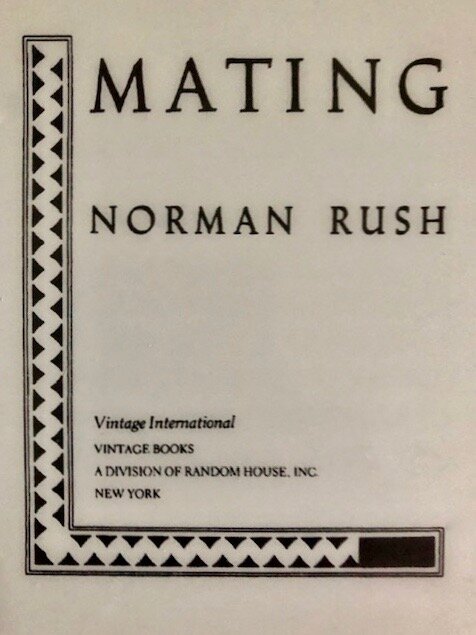I recently read Mating, a National Book Award–winning novel by Norman Rush that is set in Botswana in the early 1980s and was published in 1991.1 I was immediately drawn in by the voice of the hyperarticulate narrator, a grad student in nutritional anthropology who is never named. The book is a recounting of a love affair she had with a renowned anthropologist named Nelson Denoon, written with the help of a journal she keeps and frequently refers to. The novel takes place mostly in Tsau, a largely self-sustaining but still somewhat experimental village led by women that Denoon has established.
The narrator re-creates conversations she had with Denoon that include interesting discussions on a wide variety of topics—anthropology, economics, politics, history, literature, art, religion, philosophy, science—and the book is filled with 50-cent words in English and turns of phrase in French and Latin.2 Both of the main characters are supersmart and well-read, and they show it constantly in how they communicate with each other and, for the narrator, in her writing. She drops the French word "enfin" instead of "finally" and writes "cum grano salis" instead of "with a grain of salt." I'm glad I read Mating on Tony's Kindle, so I could easily look up words like etiology, labile, proleptic, douceur, gravamen, omphalos, and idioverse.3
Those last two words were used in the phrase "the omphalos of my idioverse," which is probably Rush's high-water mark for pretentiousness in diction.
I mostly didn't mind the constant reminders that I wasn't as erudite as these fictional characters. But constantly being confronted with unknown words made me take notice when they were repeated.
I enjoyed Rush's new-to-me figurative use of unhorsed to describe Denoon when he was worked up about something. But then he used unhorse as a verb not so many pages later: "But then he would unhorse me by reminding himself of dead undertakings he was going to revive—promoting sauerkraut and croquet were two of them."
And he used bolus in a figurative sense—it's literally a ball of chewed food or a large pill to be swallowed—six times throughout the book. To be fair, at the second mention, he has the narrator acknowledge bolus is "a word I owe to Denoon and that seems to have become indispensable to me." Yes, I'd say so.
Nugatory comes up three times—once in the context of organized exercise being "slightly nugatory" in the village of Tsau, where everyone does lots of physical labor, walking, and hill climbing. The definitions that popped up on the Kindle were "of no value or importance" and "useless; futile." Something can't be "slightly of no value" or "slightly useless," so I thought I'd caught a vocabulary error in Rush's verbal SAT test of a book. Merriam-Webster.com, however, says nugatory may involve gradations: "of little or no consequence."
The middle of the book bogged down a bit for me, with the lovers getting to know each other better and creating their mutual idioverse. I'm glad I held on and came to a point with more action and less talk, which led to another stretch of more talk and then a satisfying conclusion. Of course, I had to look up the translation of a short French sentence to be able to understand what that conclusion was.
1I highly recommend this 30th-anniversary review of Mating by Scott Sherman in The Point, but I suggest clicking on that link only after you've read the novel, because the essay reveals some plot details and wonderful lines you should experience for the first time in the book itself.
2If the French and Latin translations of the book's title I used in the title of my post aren't accurate, please let me know. Based on what I found online, ueneris amare lasciuiam may be a better translation than conjugium, but I went with the one-word option.
3That last word isn't recognized at Merriam-Webster.com, my go-to online dictionary. M-W also doesn't consider oaves—used in the sentence "My celibacy is known and is highly exciting to certain oaves on my periphery."—to be a legitimate plural of oaf.
